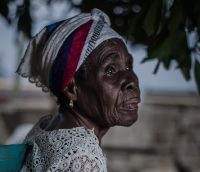 |
| Sad Muslim Girl. Image: Deposit Photos |
This series starts here. Catch up on it and enjoy the sequel.
The number of people in front of her compound was daunting. Salamatu Yakubu smiled as she thought of that word; daunting. She had seen it in the newspaper at the principal’s office when she had gone to get chalk. She memorized the spelling and got her teacher to explain the meaning. As usual, her teacher had told her to find it out herself; urging her to search the dictionary starting at ‘D’ and then, the next letter. She couldn’t help but smile at how much she was learning, which was far better than her classmates and especially, than ALL the boys in her class.
Her smile dropped when she got closer to her compound. There seemed to be an air of sadness hanging heavily around the entire compound. Her feet dragged, wanting to be spared the impending destruction to her little cocoon.
Abubakar ran to her. He was her immediate younger brother and a real pest in her life. She was about to warn him to stay away from her when she saw his tear-streaked face. She squinted to see if he was trying to play a fast one but saw that for the first time in his entire 12 years of existence, he was genuinely sad.
‘What happened?’ she asked in English before remembering to switch off school mode for home. She asked again, but this time, in Hausa.
‘What happened? Why are you crying?’
Abubakar did something that shocked the shoes off her feet; he crumbled into a heap at her feet, put his arms around her and wailed. She dropped her school bag and bent to him. She was surprised by the flood of emotions that came over her. She held him until the teary fits wracking his body subsided. At that point, it didn’t matter that they had been taught not to hold members of the opposite sex or that their mothers were different. What mattered was that they had finally bonded over something she was still to find out about.
‘Ba…ba… Baba has died.’ he said.
Salamatu flinched. She was not close to her father; had never been. That fact didn’t stop the temporary moment her heart clenched and the overwhelming that sadness came upon her. She gently pushed her brother away, picked her bag and started walking…walking away from her house…from the reality of her shattered life…from the end of what she knew. She didn’t know when she started running; running till her heart almost exploded in her chest.
Her brain led her feet to the school library; her safe place. She paused long enough to check if there was anyone about before diving in. She went straight to the third row of books, the place farthest from the door. Unlike a true library, there were no sections with major headlines and easy access. The community was too poor to afford that. A corps member who had come in to serve was the one who built the library and got her church to donate books. Since she passed out, no new book had been added to the library and many were dog-eared from overuse.
Salamatu sunk between the shelves and took the fetal position. She began to cry in earnest now. Her life was over. She was in deep trouble. And yes, she wasn’t crying that her father was dead. In fact, he had been her biggest problem since she started to understand what her life was about. She hated him and quite frankly, was glad he was dead!
***
Mallam Suleiman Yakubu was an average farmer. He did what everyone else did; planted crops in season, worked his farm, harvested and waited for the next season to begin planting again. That was his life; simple and straightforward.
He had four wives and so many kids popping out every 10 months, that at the last census, the number of his kids present at the count was 40. Thankfully, he had more boys than girls who could help in the farms and ensure that food was never a problem in his house.
He was very religious; studying the Holy Qur’an at least twice a day. He said his five daily prayers on time and lived according to the tenets of Islam. He was also against everything Western. He hated Americans and Israelis – even though he had never met any of them – and he was against everything they stood for, one of which was formal education.
He had sworn never to send any of his kids to the so called ‘school’. The school had sent many entreaties to him and even the local community leaders had asked him to send at least one child. They had all received the same answer; NO! His boys had to be on the farm most of the time and his daughters had to be prepared for marriage. He was not going to let anyone corrupt any child of his with Western ideas.
His kids had a healthy fear of him. They cowered in his presence…well, almost all of them did. His daughter, Salamatu, was defiant. She was the only child of her mother and was very stubborn. She refused to be afraid of him. In one incident, she shocked him by questioning why they needed to pray five times daily. When he told her she must do so because he said so, she told him that if he had said because Allah said so, she would have accepted it. She went further to say that his word was not absolute, as he was but a man. He remembered how he beat her to unconsciousness. That was not the last time either. She found ways to rile him up with her constant questions and opinions. If Salamatu had not been a spitting image of him, he could have sworn that she was not his child. She questioned his audacity to marry off his daughters as early as 9 years. She questioned her mothers on why the boys had to eat first and the girls make do with the remnant. In general, Mallam Yakubu decried the fact that Salamatu had a mind of her own and as such would pose a problem to her husband. He beat her lots of times to try to break her bull-headed resolve in challenging their norms, but the more he beat her, the more inquisitive she became. She once told him, ‘If you have to beat me to shut me up, then what I’m saying is true.’
It was no surprise then that at the next visit of the school delegation, he agreed to send Salamatu to the school. He could not manage her and if she was already questioning his authority, there was nothing worse the school could do to her.
It came as a surprise to Mallam Yakubu that Salamatu became calmer as soon as she started going to school. She was quieter, more respectful and always buried in one book or the other. She also did her chores on time and stopped complaining about the way things were in their community…at least, not to him anyway. Her only true joy seemed to be in the books she read. If he wanted to punish her, all he needed to do was seize her books and she would do everything he wanted. As time went on, she learned to wake up earlier to do her chores, pray, eat and then go to school. He wondered what she was learning but it would have been beneath him to ask about the Western ideas. Soon he ignored her existence until her mother came to him one evening to tell him Salamatu had seen her first period.
He summoned her to his hut the next day.
‘Salamatu.’ he all but bellowed.
‘Baba.’ she responded, staring straight into his eyes. He shook his head. None of his other children – or even his wives – would have dared to do that.
‘You are a woman now. I have told the Imam that you are to be married off. As soon as a reputable family shows interest, we will throw you a wedding Fatiha and you will go to your husband’s house.’ he said; a final note in his voice.
Salamatu’s expression didn’t flinch as she said, ‘I am too young to be married. I want to finish school and be a teacher. After that, I can consider marriage’.
‘You can CONSIDER marriage?! Are you mad?! I say WHEN you get married and you DO AS I SAY!’ Mallam Yakubu knew he was shouting but he couldn’t help himself. He didn’t have to do that with anyone else! He was rankled that he had a daughter who had a mind. Why had he been so cursed?!
She looked at him with such calm resolve that he felt insulted. ‘I will get married when I want to Baba…but not until I finish my school’. With that, she got up and walked away.
Mallam Yakubu simply got up, went outside, called her brothers, told them to gather her books and burn them. As they rushed to do so, Salamatu, like a banshee, wailed and cried and clawed and fought, to no avail. Her books were burned in her presence and with each page that caught fire, she felt like dying a little more. She cried and cried until her mother came to pry her from her brothers’ hands to cradle her to sleep.
Mallam Yakubu warned her brothers to beat her up if they saw her going to the school. And her brothers relished the opportunity! They had been envious of her school attendance and they used any opportunity to beat her up; after all, they had been given the mandate to do so.
The news spread quickly. ‘Mallam Yakubu had a daughter who questioned his authority and who challenged the place of women in their community.’ The families in town all warned their sons not to show interest in Salamatu. No one wanted a persona non grata in their family.
It wasn’t long after the sad event that Mallam Yakubu fell ill. What started up with coughs became fever, chills, fatigue, weight loss, and then the final sign that he would never recover; coughing up blood. The disease seemed to eat him more when family upon family turned down his request to marry his daughter. He was confined to his bed for months, withering away slowly. He refused to go to the hospital because he did not believe in them. And even though the traditional medicine was not working, he trusted them and continued to take them.
He kept asking for Salamatu but she refused to see him. When he asked if she was still going to school, he was told that she wasn’t but he could feel they were lying. He called her mother and made her promise she would ensure Salamatu got married.
A few days later, he called his brothers and sons. He knew he was dying. He told them to ensure that all his daughters were married to good families. He said if they could not get a good family for Salamatu, they should accept anybody who showed interest. He told them to swear by the name of Allah that Salamatu would be married off within the year. When they had sworn to that, he reminded them of their inheritance laws and he coughed one last time.
***
Salamatu was so engrossed in her pain that she did not see her mother enter. As soon as she looked up, she wanted to run but her mother held her back. When she got Salamatu pinned on the ground, she started talking.
‘You are my only child and I want you to be great. I don’t understand what they teach you in that school but I believe that it will take you places. You don’t know this, but my family were servants to a wealthy man before I was married off to your father. He had daughters who were doctors, engineers and one who had even vied to be a governor. I believe that you can be great!’ she loosened her hold on Salamatu and looked into her eyes.
‘As Lunguda women in this family, we have no inheritance. Your uncles would drive us from this compound soon. And worse, your father made them promise to marry you off to anybody. If that happens, that will be the end of your life…and mine too’ she paused, weighing her next words. ‘I have packed our things. We will run away from this village and head to Kaduna. I have sisters there. They will get me a job and I will ensure you go to school. Will you come with me?’
Salamatu didn’t even think about it. She folded herself into her mother’s arms and hugged her; the first time she had ever done that in her life. As one, they cried; cried for fate that chose their gender, cried for their collective misfortune and finally, for Mallam Suleiman Yakubu.
***
When night fell and the compound was finally quiet, Salamatu’s mother woke her up and they snuck out of the house. They walked all night and got to the village park just before dawn. Salamatu’s mother had already bribed Balarabe with all her gold – which wasn’t much – to drive them to the city. The driver was nowhere to be found. The waited and waited and soon, it was bright outside. People were beginning to come around and the cloak of darkness was no longer a protection from the prying eyes of the villagers.
Salamatu spotted her uncle – Umaru Yakubu – just as he saw them. He was the youngest and meanest of her Uncles. She tugged her mother’s hand, sending the message of fear to her. Her mother looked at her and raised her gaze in the direction Salamatu was staring. He mother froze in open fear. Then she loosened up and decided to run. Her mother had just taken a step to run when Balarabe swung in front of them. They quickly got into his car just as Uncle Umaru reached the car door. Balarabe sped off, the force of which threw Uncle Umaru to the ground. Salamatu looked behind her and saw her uncle staring at the dust kicked after them. For the first time in a long time, she smiled! She smiled genuinely!
Her name is Salamatu Yakubu. She is 13 years old. And she just escaped what her teacher would have called ‘child marriage’.






8 Comments
i was in the script.. This should be made into a movie
We hope so too!
Okey. Hope they can change.
Okay. Thanks for reading. The story is based on Lunguda culture and no matter how religious they are, they tend to prevent women from taking inheritance; whether they are Christian or Muslim. I did some research on the issue and have spoken to some people and they confirmed it. Plus, in the story, it is the father that is religious. It says nothing about his brothers.
This comment has been removed by the author.
The story waz awesome and have many lessons to be learn.
Though got confused as u said;
"He was very religious; studying the Holy Qur’an at least twice a day. He said his five daily prayers on time and lived according to the tenets of Islam"
then u said again
‘'As women in this family, we have no inheritance. Your uncles would drive us from this compound soon"
i think they are contradicting each other
Thank you dear! It may be fiction, but it is based on real scenarios!
Highly responsive to a pressing societal issue. Even if this story is not true, it clearly painted a truth. Great work.